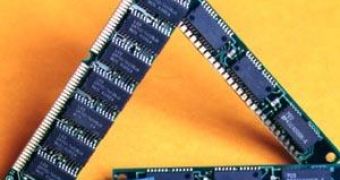The DRAM market is going through some rough times these days, and the makers are reported to register rather great loses amid weak demand and low selling prices. According to the latest news, some of them are still strong on the market, and even plan expanding through the acquisition of smaller manufacturers. One of the big players in the industry, Elpida Memory Inc., is reported to plan buying Taiwan's Powerchip Semiconductor Corp. and ProMOS Technologies Inc.
It seems that Elpidia has been in talks to acquire its DRAM partner in Powerchip, which is currently registering massive losses due to memory downturn. Moreover, the talks are also reported to involve Rexchip, a joint DRAM manufacturing venture between Elpida and Powerchip. Elpidia is currently the owner of 48.8 percent stake in Rexchip and is said to plan purchasing a 52 percent stake in the joint venture until March next year. If it does so, Rexchip would become a consolidated subsidiary of Elpida.
On the other hand, a transaction between Elpida and ProMOS would rather come as a surprise. Currently, ProMOS works with DRAM rival Hynix Semiconductor Inc, which also made investments in the smaller company. Moreover, Micron is another company that works with ProMOS.
Powerchip is reported to be seeking for a governmental bailout of about $606 million. Other news also states that Elpida and Powerchip would ask for financial assistance from the Taiwan government, while Elpidia would move more of its research and development to Taiwan in exchange. Elpidia is also stated to have reorganized its operations in an attempt to cut costs and minimize losses. The company is reported to have merged its Mobile and Digital Consumer Divisions, as well as its product quality assurance functions.
Other players in the DRAM market face hard times, including Hynix, which is reported to obtain $598 million in bank loans from its shareholders. Qimonda AG also announced a $450 million financing package. The company agreed to continue developing its R&D and manufacturing sites in Porto, Portugal and Dresden, Germany.
According to some analysts, the memory downturn has small chances to be resolved, even if the government in Taiwan gives DRAM makers a hand. One analyst believes this would only prolong the downturn and it would be a disaster for the industry.

 14 DAY TRIAL //
14 DAY TRIAL //